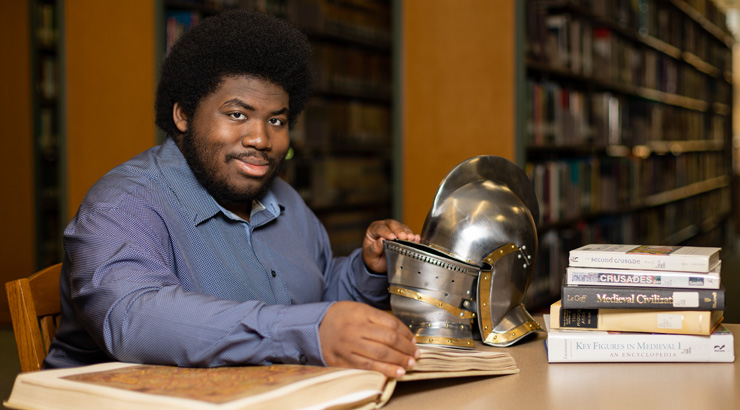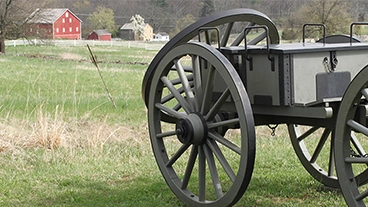
Society, History, and Culture
History Major
Discover how the past can influence the future.
Quick Look
OFFERED AS:
Major, Minor
CREDITS REQUIRED:
Major (120), Minor (18)
FORMAT:
In-Person
Turn your curiosity for the world into a fulfilling career with a Bachelor of Arts in history from Kutztown University. Our history degree takes you on a journey through time from ancient civilizations to modern-day events across the globe.
As a history major you will become an expert on researching and thinking critically about the human experience. Explore the past to evaluate current issues and events.
Dynamic. Insightful. Relevant.
Why Choose KU for a History Major
A history degree at KU is much more than the study of human change over time. It’s about developing advanced writing, analytic and research skills essential to understanding and arguing complex ideas. Employers value candidates with this type of professional experience, which is something you’re guaranteed to get as a history major.
So, why should you earn your history degree at KU?
- Small class sizes mean personalized education
- We offer affordable tuition and scholarships
- Get on-campus career experience
- Our classes are led by dedicated faculty

Meet History major Jeffrey Pender!
History Major Highlights
A history degree at KU opens doors to careers in government, education, historical societies, archives, libraries, research foundations, media and business.
We go beyond the textbook, prioritizing hands-on experience preparing you for real-world challenges as a history major. Whether you plan to attend graduate school or jump directly into your career, you will have the tools to navigate an ever-evolving workforce.
Program Highlights:
- Participate in the history club
- Complete faculty-mentored research
- Participate in unique internship opportunities
- Join Phi Alpha Theta Honor Society
- Apply to history-specific scholarships
- Study abroad with other history majors
Student Learning Outcomes
-
History (BA)
Note: writing skills are embedded in each of these SLOs.
- Historical Content: Students will describe historical phenomena from different world regions, time periods, or approaches.
- Research Skills: Students will apply research skills into historical projects.
- Critical Thinking: Students will critically analyze the strengths and weaknesses of historical accounts.
I'd tell prospective students that it is incredibly unique how much the professors care about the individual students. I also think that a lot of students think they can only do a history degree if they are interested in doing history after college. That is just not the case these days and history has served me well.
Isabelle Waddelow ' 20, Assistant Director of Admissions, DCCC|
Top Internship Locations for History Majors |
|---|
|
Pennsylvania German Cultural Heritage Center |
|
Kutztown Area Historical Society |
|
Moravian Historical Society |
|
Lancasterhistory.org |
|
Pennsylvania House of Representatives Archives |
|
Reading Public Museum |
|
Landis Valley Farm and Village Museum |
|
Top Job Placements for History Graduates |
|---|
|
Washington National Cathedral |
|
Maryland Judiciary |
|
York County District Attorney's Office |
|
Allentown Art Museum |
|
National Park Service |
| Lehigh County Government |
|
Brown University |
|
The Biltmore Mansion |
Frequently Asked Questions about the History Major
-
What can I do with a history major?
A history major from Kutztown University can take you places beyond the classroom. Whether you plan to pursue a job in education, business, journalism or another industry, you’ll have no shortage of options.
The following are career paths you can pursue with an undergraduate history degree:
- Archivist
- Author
- Educator with teacher certification
- Foreign news correspondent
- Historian
- Museum curator
- Paralegal
- Park ranger
- Public administrator
- Museum worker
Reseacher
-
What on-campus career experience can I get as a history major?
Various clubs and organizations on KU’s campus and the surrounding area allow you to get more experience as a history major.
-
What other history majors does KU offer?
Kutztown University offers two other history majors: a B.A. in History with LCCC’s Paralegal Studies Certificate and a B.S. in Secondary Education/Social Studies.
The B.A. in history degree with LCCC’s Paralegal Studies Certificate boasts an 80 to 90 percent placement and continuing education rate. LCCC’s Paralegal Studies Certificate focuses on the paralegal profession and the limitations imposed by the unauthorized practice of law.
History students have the option of completing an LCCC’s ABA-approved Paralegal Studies Certificate. The Certificate is comprised of seven Paralegal Courses offered through our exclusive partnership with Lehigh Carbon Community College. Students take 7 paralegal classes (6 requirements and 1 elective) that are all offered on Kutztown University’s campus. Students will transfer nine KU credits at the 200 level back to LCCC as electives.
Students in the History with Paralegal Studies program will gain an understanding of what paralegals can accomplish, as well as the limitations imposed by the unauthorized practice of law statute. Paralegals may not provide legal services directly to the public except as permitted by law.
LCCC’s Paralegal Studies program options are primarily offered through synchronous instruction. Paralegal Studies classes may be enhanced with asynchronous materials. Paralegal Studies students must take at least nine-semester credits or the equivalent of legal specialty courses through synchronous instruction.






